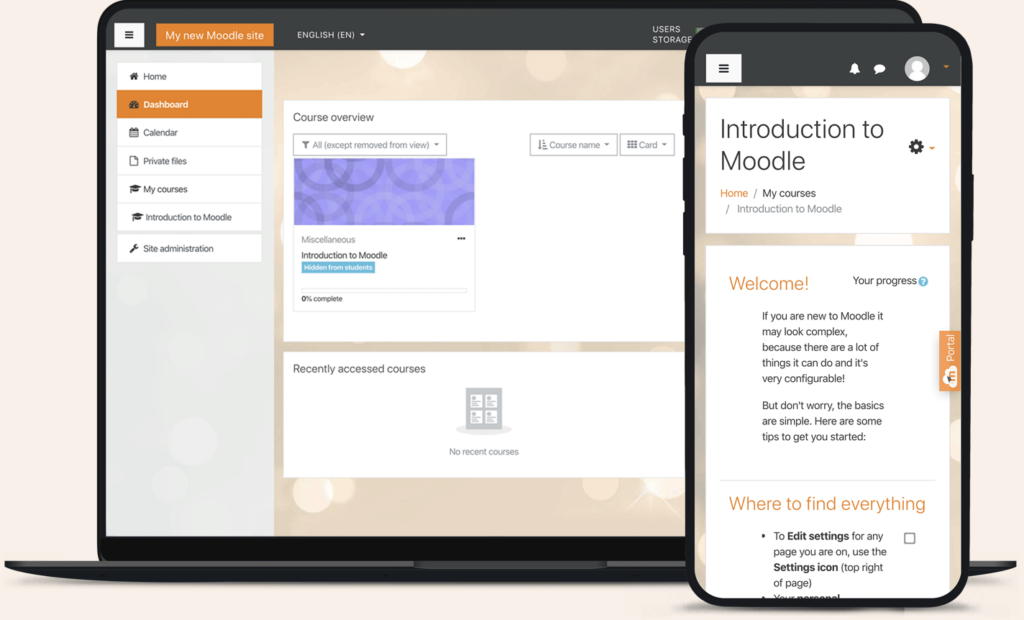This post explores the top Moodle hosting requirements crucial for improving user experience. User experience (UX) profoundly impacts the success of e-learning platforms.
Moodle, a popular open-source Learning Management System (LMS), is widely available for online education.
By prioritizing these requirements, educators can create a seamless and productive e-learning environment for learners and instructors alike.
Here are Moodle hosting requirements:
- Disk Space:
Moodle code: 200MB of disk space is the minimum requirement to host the Moodle application, including the core files and system components.
Content storage: 5GB is a realistic minimum, but the requirement will depend on the amount of content uploaded and shared within the Moodle platform.
- Processor:
Minimum: The processor should be at least 1 GHz. It’s the minimum processing power to run the Moodle application and handle basic user interactions and course navigation.
A dual-core processor with a clock speed of 2 GHz or higher is best for better performance, especially in concurrent users and complex operations.
- Memory (RAM):
Minimum: At least 512MB of RAM is required to run Moodle adequately. This memory is essential for handling system processes and ensuring smooth operation.
The recommended 1GB or more RAM to accommodate more concurrent users and ensure better responsiveness.
- Bandwidth:
Minimum: A bandwidth of 100Mbps (Megabits per second) is the minimum requirement to handle user interactions, content delivery, and data transfers on the Moodle platform.
It’s recommended: For larger user bases and enhanced user experience, having a bandwidth capacity of 1Gbps (Gigabit per second) or more is beneficial.
- Operating System:
Moodle can run on either Linux or Windows operating systems. Both options are widely supported, but Linux is often recommended for its stability, security, and compatibility with open-source technologies.
- Web Server:
Moodle can be hosted on either Apache or Nginx web servers. These popular and robust web server options can efficiently serve Moodle’s web pages to users.
- Database:
Moodle requires a database to store user data, course information, and configurations. The supported databases are MySQL and MariaDB.
Both are open-source relational database management systems widely used in conjunction with Moodle.
Evaluating cost-effective hosting solutions:
When seeking a Moodle hosting service, cost-effectiveness is a crucial factor. It involves finding a hosting solution that best saves money while meeting the requirements.
Here are some considerations when evaluating cost-effective hosting solutions for Moodle:
- Pricing Plans: Look for options that align with your budget while providing the essential features for your e-learning platform.
- Resource Allocation: Ensure that the resources allocated are sufficient for your expected number of users and content.
- Security Measures: Ensure that the hosting provider implements robust security measures to protect your Moodle platform and user data from potential threat
- Performance and Uptime: A slightly higher cost for a more reliable hosting service can be worthwhile in avoiding frequent downtimes and ensuring a smooth user experience.
- Scalability: Check if the hosting solution allows for easy scalability, enabling you to upgrade resources as your Moodle platform grows.
- Support: Choosing a hosting provider that offers good support if you need help with your Moodle installation is important.
- Features: Some Moodle hosting providers offer additional features, such as automatic updates, backups, and support. Get one that best suits you!
Balancing costs, performance, and quality in check
- Limit spending: You can save money if your Moodle platform uses all the resources in your pricey hosting plan.
- Quality counts: Choosing the least expensive choice could lead to poor performance, frequent outages, or inadequate support. Put dependability and the reputation of the hosting company first.
- Scalability planning: Consider your platform’s anticipated development when selecting a hosting option. Pay more upfront for scalable hosting to avoid future migration headaches.
- Security: Don’t compromise on security measures to save costs. A secure hosting environment protects your platform and user data from potential threats.
- Customer support: Consider the technical support and customer service offered by the hosting company. Quick problem resolution depends on responsive support.
Concluding on: Moodle Hosting Requirements;
The provided requirements are the minimum for effective Moodle operation. Larger e-learning platforms with more users and content should surpass these specs for improved performance, reliability, and user experience.
Hosting needs will vary based on the Moodle deployment’s size and active users. Choosing the right Moodle hosting is crucial for a successful e-learning experience.
Choose the right Moodle hosting for a seamless e-learning experience. Prioritize quality hosting to enhance user engagement and learning outcomes.
Opt for reliable and scalable solutions to create a positive and productive e-learning environment.






